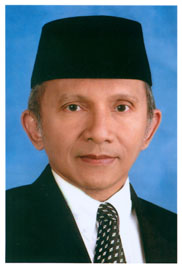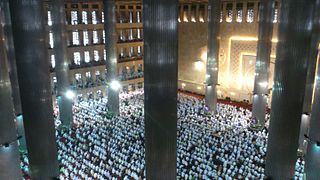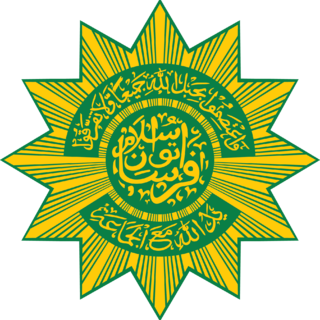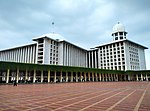Related Research Articles

Nahdlatul Ulama is an Islamic organization in Indonesia. Its membership estimates range from 40 million (2013) to over 95 million (2021), making it the largest Islamic organization in the world. NU is also a charitable body funding schools and hospitals as well as organizing communities to help alleviate poverty.

Muhammad Amien Rais is an Indonesian politician. He was one of the leaders of the reform movement that forced the resignation of President Suharto in 1998. Amien Rais was the leader of Muhammadiyah, one of the two biggest Muslim organizations in Indonesia, from 1995 to 2000. He was the Chairman of the People's Consultative Assembly (MPR) from 1999 to 2004. During his chairmanship, the MPR passed a series of amendments to the Constitution of Indonesia. These amendments, among other things, established direct presidential elections, a presidential term limit, and the Constitutional Court.

Islam is the largest religion in Indonesia, with 86.7% of the Indonesian population identifying themselves as Muslim in a 2018 survey. Indonesia is the most populous Muslim-majority country, with approximately 231 million adherents.

Nurcholish Madjid, in Indonesia affectionately known as Cak Nur, was a prominent Indonesian Muslim intellectual. Early in his academic career, Nurcholish was a leader in various student organizations. He soon became well known as a proponent for modernization within Islam. Throughout his career he continued to argue that for Islam to be victorious in the global struggle of ideas, it needs to embrace the concepts of tolerance, democracy and pluralism.

Yusril Ihza Mahendra is an Indonesian lawyer, politician and academic, who is currently serving as the leader of the Crescent Star Party (PBB) since 2015. Previously, he served as the leader of the PBB from 1998 until 2005, Minister of Justice and Human Rights from 2004 until 2007, and member of the People's Representative Council from 1999 until 2009.

Muhammadiyah ; officially Muhammadiyah Society is a major Islamic non-governmental organization in Indonesia. The organization was founded in 1912 by Ahmad Dahlan in the city of Yogyakarta as a reformist socioreligious movement, advocating ijtihad - individual interpretation of Qur'an and Sunnah, as opposed to Taqlid - conformity to the traditional interpretations propounded by the ulama. Since its establishment, Muhammadiyah has adopted a reformist platform mixing religious and secular education, primarily as a way to promote the upward mobility of Muslims toward a 'modern' community and to purify Indonesian Islam of local syncretic practices. It continues to support local culture and promote religious tolerance in Indonesia, while a few of its higher education institutions are attended mostly by non-Muslims, especially in East Nusa Tenggara and Papua provinces. The group also runs a large chain of charity hospitals, and operated 128 universities as of the late 1990s.

The Council of Indonesian Muslim Associations, better known as the Masyumi Party, was a major Islamic political party in Indonesia during the Liberal Democracy Era in Indonesia. It was banned in 1960 by President Sukarno for supporting the PRRI rebellion.
The Indonesian Association of Muslim Intellectuals is a Muslim organization in Indonesia. Founded in 1990 by Indonesian Secretary of Research and Technology B. J. Habibie, the organisation is committed to fight against poverty and improve education in Indonesia.
Islamic modernism is a movement that has been described as "the first Muslim ideological response to the Western cultural challenge," attempting to reconcile the Islamic faith with modern values such as democracy, civil rights, rationality, equality, and progress. It featured a "critical reexamination of the classical conceptions and methods of jurisprudence", and a new approach to Islamic theology and Quranic exegesis (Tafsir). A contemporary definition describes it as an "effort to re-read Islam's fundamental sources—the Qur'an and the Sunna, —by placing them in their historical context, and then reinterpreting them, non-literally, in the light of the modern context."

Fakih Usman was an Indonesian Islamic leader and politician of the Masyumi Party. He twice served as the Minister of Religious Affairs under the cabinets of Abdul Halim and Wilopo from January until September 1950, and again from 1952 until 1953. In his early years, Fakih was criticized by conservative Muslims for his involvement with the modernist Islamic Muhammadiyah organization, though he is remembered fondly by the group. Born to a merchant and his wife in Gresik, Dutch East Indies, Fakih studied with his father and at a series of pesantren until the 1920s.

Persatuan Islam is an Islamic organization in Indonesia founded on 12 September 1923 in Bandung by a group of Muslims who are interested in education and religious activities led by Haji Zamzam and Haji Muhammad Yunus.
The Indonesian Islamic Propagation Council is a Sunni Islamic organization in Indonesia which aimed at dawah (proselytizing). The organization is considered one of the most prominent dawah organisations in modern Indonesia. It is also noted for being the primary receiver of funding for Islamic activities in Indonesia from Saudi Arabia.

Islam Nusantara or Indonesian (Islamic) model is a term used to refer to the empirical form of Islam that was developed in the Nusantara. This term was introduced and promoted by the Indonesian Islamic organization Nahdlatul Ulama (NU) in 2015, as an alternative for the interpretation and representation of global Islam that is currently dominated by Arabization—i.e. Saudi Wahhabism.
Budhy Munawar-Rachman is an Indonesian progressive Islamic scholar. He is a lecturer of Islamic studies at Paramadina University and an editor of Islamic journal Ulummul Qur'an. He is influenced highly by the renowned Indonesian Islamic scholar Nurcholish Madjid and considered as the successor of Madjid's strand of progressive Islamic thoughts, namely Islamic neo-modernism.

Islam is the most adhered religion in West Sumatra, a province of Indonesia, embraced by 97.42% of the whole population. The Muslim population increases to 99.6% if it excludes the Mentawai Islands, where the majority of the non-Muslim (Protestant) West Sumatrans reside. Denomination among Islam in West Sumatra is predominantly Sunni Islam, and there is a small Shia Islamic pocket within the coastal city of Pariaman. Minangkabau people, indigenous to West Sumatra and comprise 88% of the West Sumatran population today, have historically played an important role within the Muslim community in Indonesia. Up until today the region is considered one of the strongholds of Islam in Indonesia.

Nahdlatul Wathan is an Islamic socio-religious organization based in Lombok, West Nusa Tenggara province, Indonesia. The organization was established by Muhammad Zainuddin Abdul Majid at Pancor, East Lombok Regency in 1953. The organization serves as a vehicle for societal movement, education, and Islamic proselytization (da'wah). It is currently the largest and the most influential Islamic mass organization in Lombok.
Jemaah Tarbiyah, also known as the Tarbiyah movement or the Dakwah movement, is an Islamic religious movement based in Indonesia. Jemaah Tarbiyah was an active movement during the 1980s to 1990s and consisted of university students, aimed at the religious education and da'wah (proselytizing). The movement is considered to be influenced by the teaching of Muslim Brotherhood. It is considered an important influence for Islamization of Indonesia. The movement became the bedrock of the Islamist party Prosperous Justice Party (PKS) which was founded in 2002.
In the context of Muslim society in Indonesia, Traditionalism or traditionalist Islam refers to a religious strand which puts emphasis on preserving traditionally established local rituals and scholarship. Traditionalist Muslims refer to themselves as ahlussunnah wal-jamā'ah or aswaja. Traditionalism is often contrasted with modernism, which is inspired by modernity and rationalism. Traditionalism has been the most adhered Muslim religious orientation in the history of contemporary Muslim Indonesia. The extent of traditionalism widely overlaps with the influence of a socio-religious organization Nahdlatul Ulama, the biggest Muslim organization in Indonesia. Traditionalism is also a critical element within the Muslim intellectual movement known as Islam Nusantara.
In July 2005, Indonesian Ulema Council (MUI), a semi-official Islamic clerical body of Indonesia, issued a fatwa, or an Islamic legal opinion, against religious pluralism, liberalism, and secularism. The issuance of fatwa garnered substantial controversy and scholarly attention. The fatwa addressed the reformist trend of Islam which had been popular among the broad Indonesian society over the past 25 years. Such trends advocated for a more substantive reading of the Quran and Hadith, instead of literalist approaches taken by the majority of ulamas. MUI considered such ideas as incompatible with Islamic teaching, releasing the fatwa to promote a more literal reading of the Islamic scriptures. The fatwa was heavily criticized by progressive Muslim intellectuals.
Dawam Rahardjo was an Indonesian Muslim scholar and human rights activist. An economist by profession, Dawam was widely known for his uncompromising defence of minority groups and his advocacy for religious pluralism in Indonesian society. He was awarded the Yap Thiam Hien Award in 2013.
References
- Ali, F. and Effendy, B. (1986). Merambah Jalan Baru Islam: Rekonstruksi Pemikiran Islam Indonesia Masa Orde Baru. Bandung: Mizan.
- Barton, G. (1994). The Impact of Neo-modernism on Indonesian Islamic Thought: The Emergence of a New Pluralism. In D. Bourchier and J. Legge (Eds.), Democracy in Indonesia: 1950s and 1990s (pp.143-150). Clayton: Centre of Southeast Asian Studies, Monash University.
- Barton, G. (1995). Neo-modernism: A Vital Synthesis of Traditionalist and Modernist Islamic Thought in Indonesia. Studia Islamika, 12(3), 1–76.
- Burhani, N. (2016). Muhammadiyah Berkemajuan: Pergeseran dari Puritanisme ke Kosmopolitanisme. Bandung: Mizan.
- Bush, R. (2009). Nadhlatul Ulama & the Struggle for Power within Islam & Politics in Indonesia. Singapore: ISEAS Publishing.
- Feener, M. (2007). Muslim Legal Thought in Modern Indonesia. New York: Cambridge University Press.
- Geertz, C. (1960). The Religion of Java. Glencoe IL: Free Press.
- Hefner, R. (2000). Civil Islam. Princeton: Princeton University Press.
- Machmudi, Y. (2008). Islamising Indonesia: The rise of Jemaah Tarbiyah and the Prosperous Justice Party (PKS). ANU Press. Retrieved from https://www.jstor.org/stable/j.ctt24hddh
- Von Der Mehden, F.R. (1995). Indonesia. In J.L. Esposito (Ed), The Oxford Encyclopedia of the Modern Islamic World. Oxford: Oxford University Press.
